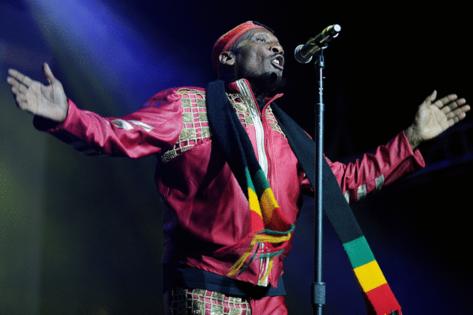Jimmy Cliff, reggae legend and actor known for 'The Harder They Come,' dies at 81
Published in Entertainment News
LOS ANGELES — Jimmy Cliff, the Jamaican musician and actor who helped popularize reggae around the world and paved the way for future stars of the genre such as Bob Marley, has died. He was 81.
Cliff’s wife, Latifa Chambers, announced the singer’s death in a statement shared Monday on social media, writing that he “crossed over due to a seizure followed by pneumonia.” Additional information was not immediately available.
“To all his fans around the world, please know that your support was his strength throughout his whole career,” the post on Instagram read. “He really appreciated each and every fan for their love.”
Cliff starred in the 1972 Jamaican crime film “The Harder They Come” and is known for the movie’s title track and other songs, including “Many Rivers to Cross” and “You Can Get It If You Really Want.”
Writing on social media, Jamaica’s prime minister, Andrew Holness, called Cliff “a true cultural giant whose music carried the heart of our nation to the world.” He added that Cliff’s songs “lifted people through hard times, inspired generations and helped to shape the global respect that Jamaican culture enjoys today.” In addition to his wife, Cliff’s survivors include the couple’s two children, Lilty and Aken.
“The Harder They Come,” in which Cliff played a Robin Hood-like folk hero, connected with audiences at home and in the United States, where it became a mainstay of the midnight-movie scene. The film’s soundtrack, with songs by Cliff and other Jamaican acts such as the Maytals and Desmond Dekker, was an international hit; in 2020 the album was inducted into the Library of Congress’ National Recording Registry.
Born James Chambers in Jamaica’s St. James Parish in 1944, Cliff moved to Kingston as a young man to pursue music and found success with a series of local hits including “Hurricane Hattie.” He ventured to London in the mid-’60s and struck a deal with Island Records, which would later sign Marley; Cliff’s 1969 single “Wonderful World Beautiful People” entered the top 10 of the British pop chart.
“All I really wanted to do was to get out this creative yearning that was inside of me,” Cliff told The Times in 1999.
Yet he also channeled the era’s antiwar sentiment with “Vietnam,” which according to rock legend Bob Dylan once described as the best protest song ever written.
Cliff toured the world in the wake of “The Harder They Come,” which the Clash would go on to name-check on 1979’s “London Calling.” In 1976, Cliff performed on the first season of “Saturday Night Live”; he also spent time in Africa and converted to Islam.
In the early ’80s, Bruce Springsteen made Cliff’s song “Trapped” a part of the E Street Band’s concert repertoire; a live recording of the song appeared on the “We Are the World” album in 1985. Cliff sang on the Rolling Stones’ “Dirty Work” album in 1986, the same year he won his first Grammy Award, for his album “Cliff Hanger.”
In 1994 he made the top 20 of Billboard’s Hot 100 with a cover of Johnny Nash’s “I Can See Clearly Now,” which he recorded for the movie “Cool Runnings.” Cliff was inducted into the Rock & Roll Hall of Fame in 2010; he won a second Grammy in 2013 for his album “Rebirth,” which he made with Tim Armstrong of the punk band Rancid and which he said was inspired in part by the Occupy Wall Street movement.
“I did a song called ‘Vietnam’ about that era, about that war, about people are marching,” Cliff told The Times in 2012. “People are still marching now but for a different cause. I feel I need to be singing about those things.”
--------
—Times senior editor Janine Schaults contributed to this report.
---------
©2025 Los Angeles Times. Visit at latimes.com. Distributed by Tribune Content Agency, LLC.













Comments